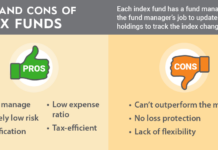
There are many investing decisions to make as an investor, especially when it comes to what investment strategy suits you. One of those debates will hinge towards the individual stocks vs. equity funds argument. Which one of these is best for you?
For starters, what’s the difference between individual stocks and equity funds? Investing in individual stocks means you’re solely responsible for the stocks you invest in as well as the buy and selling decisions. Every research that needs to go into the investment decisions is all on you, so is keeping up to date with the companies whose stocks you’ve bought.
Equity funds or stock funds, on the other hand, are mutual funds that invest in stocks. Although equity funds are either actively or passively managed, the portfolio manager is in charge of the investment decision and any research involved in managing the portfolio. Your responsibility as an investor is to keep increasing your investments in the portfolio, re-investing the capital gains and the dividends, and keeping up with the management and the company’s financial reports.
So, which of these investing strategies is right for you and your financial goals? Here’s how you can decide:
Analyzing Companies
Do you enjoy researching companies’ information, from their industry and sector information to the costs, products, management, and other strategic information? How interested are you in the news and developments happening in that company you want to buy shares in? How market performance might affect its profits or any change in management.
If such does not interest you, or it’s quite overwhelming to understand, it’s best that a professional portfolio manager does it on your behalf.
Financial Statements: Reading and Understanding
How much of the financial statements can you read and understand? If you are familiar with the income statements and the statement of financial position (balance sheet) and can do the analysis like financial ratios, then investing in individual stocks will not be that challenging for you.
Part of the research that portfolio managers do involve analyzing the financial statements of companies they are interested in. If you can do this and have time on your hands to mull over multiple companies’ financial statements, there’s no need to hire a portfolio manager.
Management
Diversifying a portfolio is one of the secrets to a good investment. Equity funds will have multiple stocks, but these have professionals who handle all the management. If you have a well-diversified portfolio of individual stocks, you are likely looking at having 10-20 individual stocks.
Do you have the time and the energy to keep track of these stocks, do the research, and analyze the financial statements? Or keeping up with the dividends and payment dates?
An equity fund is probably the way to go if you are looking at building your investment portfolio on a single spreadsheet. If you are willing to have a large spreadsheet with a huge portfolio history, individual stocks will do.
What should you choose?
Building an investment portfolio out of individual stocks is an overwhelming undertaking. You need to have enough time to research and manage the entire portfolio, ensuring you balance it enough to maximize returns and reduce risks. Is that thrills and does not bore you to death, why not. But, if enjoying margaritas and other fun things rather than spending your time thinking of the best company to invest in, equity funds might suit you. An equity fund is more diversified, and with a portfolio manager, it’s less time-consuming.











